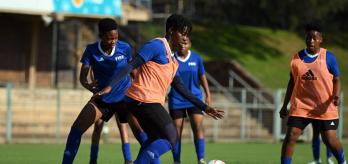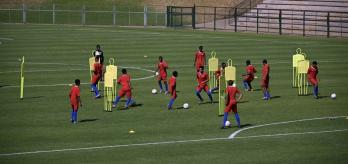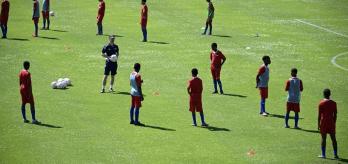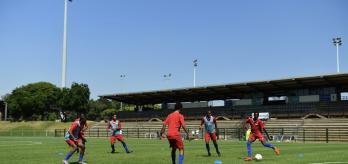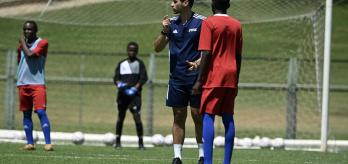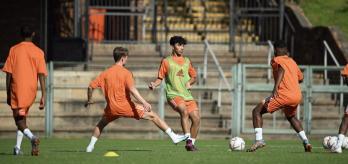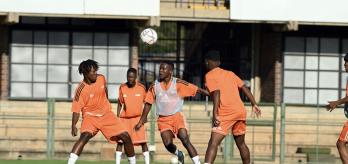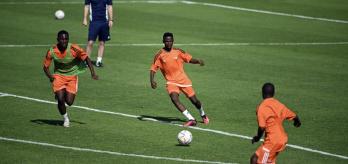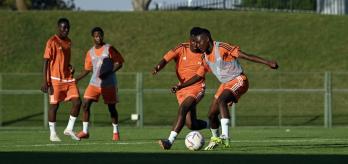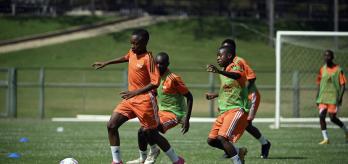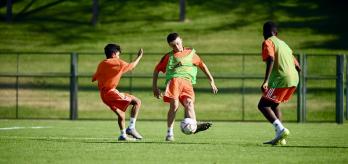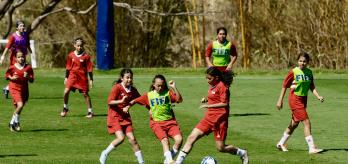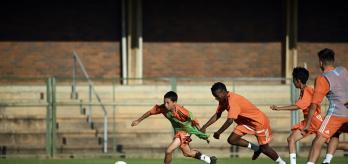Methodology
The intention: What is practised?
The objective of the exercise is to enhance a team’s ability to build and progress playing through central areas with a narrow focus. It does not include aspects like creating and finishing. The drill emphasises quick combinations and close support movement to advance play into the next line. Team members must constantly scan before receiving and think ahead so they can identify how to combine play to play forward or in variation 3's case, pass and continue. The goal is to execute three or four-player passing combinations with players using an open, side-on body shape and sharp, one-touch passes to penetrate the opposition. Players should find space between opponents to connect play. On the player level, signalling and gesturing help teammates know where to move.
The scale: For whom is this relevant?
The exercise revolves around the unit level and focuses on the team’s ability to play through the lines. The drill is particularly relevant to players operating in central areas of the pitch, where they must play forwards or play back to go forwards, with passes out wide not an option. The four outside players represent players positioned outside of the opposition’s shape, such as centre-backs who do not need to worry about being pressed from behind, while the four players inside the area represent players operating inside the opposition’s structure and primarily represent midfielders. The team’s focus is on linking play from the defensive line through the midfield line and into attack, where an attacker may have dropped to receive the ball.
The practice type: How is the practice designed?
The exercise involves a possession game with variable repetition, providing ample opportunities for practicing quick passing, offering to receive, and movement when playing forwards. The drill is directional, with teams playing in one direction and back, encouraging assertiveness. Teams must quickly switch their focus to play or press in another direction upon losing or winning the ball, promoting mindset shifts during transitions. Limiting players to one or four or more touches forces them to plan their actions. If a first-time pass isn't possible, players must secure the ball. A scoring system for individual players encourages initiative in tight areas. The exercise is non-position-specific, though outside players may act as unpressed center-backs.
Session plan
Organisation
-
Mark out a 20x20m exercise area.
-
Divide the exercise area into 4 boxes.
-
Divide the group into 2 teams of 8 (oranges and blues).
-
On each team, position 2 players at opposite ends of the exercise area and 4 players inside the area.
Explanation
-
The 4 boxes are for orientation only. Players inside can move freely, while players outside must stay outside.
-
The oranges start with the ball and try to progress play from one end of the exercise area to the other and back.
-
If the blues win the ball, they try to do the same.
-
The blues try to play from one side of the exercise area to the other and back, while the oranges look to play in the opposite direction and back.
Variation 1
-
To force players to think about their future actions, play 1 touch or 4 or more touches, i.e. players cannot take 2 or 3 touches.
Variation 2
-
Remove the restriction on touches and allow players to take as many touches as they like, but ask them to think at the same speed as in the previous variation.
-
Players on the outside are now allowed to enter the area and anchor players must fill their position should they do so.
Variation 3
-
1 point for connecting a pass to the opposite side from the “build-up” zone.
-
2 points for playing to the other side from an attacking zone.
Key coaching points
Roles of coaches
-
First coach: leads the session and explains the rules of the exercise.
-
Second coach: serves balls into players to keep the exercise flowing and to avoid any stoppages.
- Third coach: offers players encouragement and advice from their position on one side of the exercise area.

























